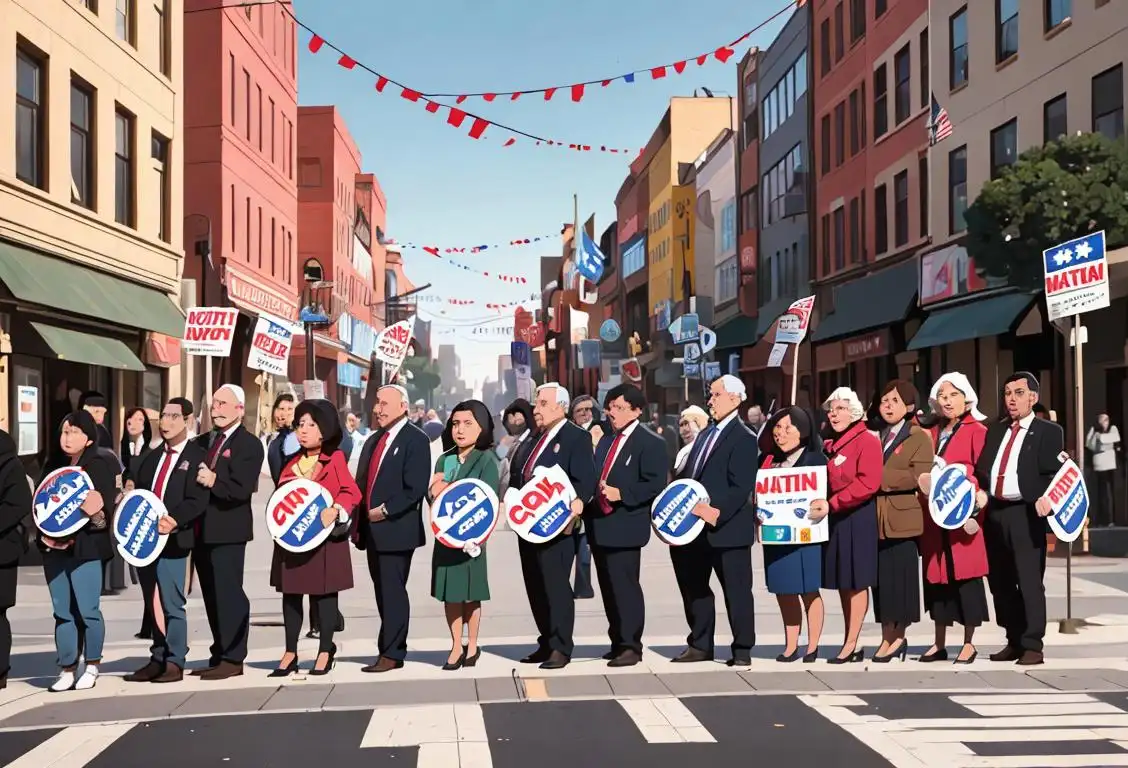National Campaign To Change The Date Of Australia Day

Hey there mate! Are you ready to dive into the fascinating world of the National campaign to change the date of Australia Day? Let's get started!
When is Campaign To Change The Date Of Australia Day?
It's national campaign to change the date of australia day on the 14th January.
The Internet Buzz
So, it seems like the National campaign to change the date of Australia Day has been creating quite a stir online. Our trusty WhatNationalDayIsIt.com detectors picked up a whopping 29 mentions, with the most chatter happening on January 14, 2018. People are definitely engaged in this discussion!
What's the Fuss All About?
If you're not familiar with the campaign, here's the lowdown. As it currently stands, Australia Day is celebrated on January 26th each year. But there's been a growing movement to change the date out of respect for the Indigenous population of Australia. The argument is that the current date marks the arrival of European settlers and is regarded by many as the start of the dispossession and marginalization of Indigenous people.
This campaign advocates for moving Australia Day to a different date that represents unity and inclusivity for all Australians. Supporters argue that it's a necessary step toward reconciliation and acknowledging the true history of Australia.
What's Happening Online?
The online conversation is diverse, with passionate voices both for and against changing the date. Social media platforms, news websites, and forums have become hotspots for debate and discussion. It's truly a digital battlefield!
Seize the Day, Mate!
As this campaign gains momentum, it's important to remember that the ultimate goal is to foster understanding, inclusivity, and compassion. Whether you support changing the date or not, engaging in respectful dialogue can help bridge the gap and build a stronger, more cohesive Australia.
History behind the term 'Campaign To Change The Date Of Australia'
1938
Abolition of Australia Day
The campaign to change the date of Australia began in 1938 with the Aborigines Progressive Association, a civil rights organization led by Aboriginal activists William Cooper and Jack Patten. They organized a protest on January 26, which they called the 'Day of Mourning,' to challenge the celebration of Australia Day on the anniversary of the arrival of the First Fleet. The Day of Mourning highlighted the ongoing injustices faced by Aboriginal people and called for equal rights and recognition.
1994
The Aboriginal and Torres Strait Islander Commission (ATSIC) proposes Date Change
In 1994, the Aboriginal and Torres Strait Islander Commission (ATSIC) formally proposed changing the date of Australia Day. ATSIC argued that celebrating Australia Day on January 26th, the anniversary of the arrival of the First Fleet, was insensitive to Indigenous Australians as it marked the beginning of colonization and dispossession of their lands.
1994
Establishment of National Sorry Day
In 1994, Australians celebrated the first National Sorry Day, a day dedicated to acknowledging and raising awareness of the historical mistreatment of the Indigenous population. The day aimed to promote reconciliation and healing, especially in light of the forced removal of Aboriginal and Torres Strait Islander children from their families, known as the Stolen Generations.
2018
The rise of the movement
The campaign to change the date of Australia's national day first gained momentum in 2018. Many indigenous Australians and their allies began advocating for a shift away from celebrating Australia Day on January 26th, which marks the anniversary of the arrival of the First Fleet in 1788. For indigenous groups, this date represents the beginning of colonization and the displacement and mistreatment of their ancestors.
1938
The Day of Mourning
On January 26, 1938, Aboriginal leaders and activists organized a protest called 'The Day of Mourning' in Sydney, Australia. This event marked the 150th anniversary of British colonization and aimed to raise awareness about the mistreatment and injustices faced by Indigenous Australians. The protest called for full citizenship rights, better living conditions, and the recognition of Aboriginal culture and history.
1971
The Aboriginal Tent Embassy
In 1971, the Aboriginal Tent Embassy was established on the lawns of Parliament House in Canberra, Australia. This protest site was set up to draw attention to the ongoing struggles and mistreatment of indigenous Australians. The embassy aimed to highlight the need for land rights, self-determination, and increased recognition of Aboriginal rights and culture.
1999
Public Debate Begins
The public debate about changing the date of Australia Day begins in 1999. This discussion was sparked by the growing recognition that the date of Australia Day, which is celebrated on January 26th, marks the anniversary of the arrival of the First Fleet, representing the beginning of British colonization and the displacement and mistreatment of the indigenous Aboriginal and Torres Strait Islander peoples.
1994
The establishment of Australia Day
Australia Day is a national holiday in Australia, celebrated on January 26th each year. It commemorates the arrival of the First Fleet at Sydney Cove in 1788, marking the beginning of European settlement in Australia. Initially, Australia Day was seen as a unifying celebration of Australian identity and culture.
1997
Formation of the Stolen Generations Alliance
In 1997, the Stolen Generations Alliance was formed to bring together organizations and individuals who supported the rights and well-being of the Stolen Generations. The Alliance played a crucial role in raising awareness and advocating for justice and compensation for those affected by the forced removal policies.
1998
First official call for Date Change
In 1998, the Australian Democrats became the first political party to officially support changing the date of Australia Day. They argued that January 26th was divisive and excluded Indigenous perspectives, and suggested other dates, such as May 27th, which commemorates the 1967 referendum that recognized Aboriginal people as citizens.
2019
Growing support
In 2019, the campaign to change the date continued to gather support across the country. More Aboriginal and Torres Strait Islander communities, as well as non-indigenous Australians, joined the movement. A significant number of local councils and organizations decided not to hold celebrations on January 26th and instead focused on fostering inclusivity and recognizing the concerns of indigenous peoples.
1972
Australia Day as Invasion Day
Throughout the 1960s and 1970s, the Australian Aboriginal movement gained momentum. In 1972, the newly formed Aboriginal Tent Embassy in Canberra declared Australia Day as 'Invasion Day' and launched protests to draw attention to the continued dispossession and marginalization of Aboriginal people. This marked a significant shift in the campaign, framing Australia Day as a day of mourning for the Aboriginal community.
1938
The Day of Mourning protest
On January 26, 1938, Indigenous activists organized the Day of Mourning protest in Sydney. This event marked the 150th anniversary of the First Fleet's arrival and highlighted the ongoing discrimination and dispossession of Aboriginal and Torres Strait Islander peoples. The protest called for equal rights and recognition.
2001
First Protest
In 2001, the first organized rally calling for a change to the date of Australia Day takes place. The rally, held in Sydney, gathers a significant number of participants who believe that celebrating the arrival of British colonizers on the current date is disrespectful to Indigenous Australians. This protest marks the beginning of a larger movement seeking to change the date.
1988
The Bicentennial Celebration
The year 1988 marked the bicentenary of European settlement in Australia, an event that has been controversially celebrated as the nation's founding moment. However, the celebrations were met with significant resistance and protests from indigenous Australians and their supporters. Many saw the bicentennial celebration as a painful reminder of colonization and dispossession, leading to increased calls for change.
1972
The Aboriginal Tent Embassy
In 1972, the Aboriginal Tent Embassy was established outside Parliament House in Canberra, Australia. This protest site was established by Aboriginal activists to demand land rights and highlight the ongoing injustices faced by Indigenous Australians. Among their demands was a call to change the date of Australia Day from January 26, which they saw as a symbol of invasion and dispossession.
1988
200 Years of Survival
The year 1988 marked two centuries since the arrival of the First Fleet, and it became a significant turning point in the campaign. The Australian Bicentennial celebration, intended to commemorate the nation's history, faced backlash as Aboriginal people and their supporters saw it as a celebration of colonization. This gave rise to widespread protests and a call to change the date. The campaign gained considerable public attention and support during this time.
2007
Growing Momentum
By 2007, the campaign to change the date of Australia gains significant momentum. Various organizations, including Indigenous rights groups and activists, start actively advocating for a new date. The movement aims to promote a more inclusive national day that acknowledges the history and culture of all Australians, both Indigenous and non-Indigenous.
1998
National Sorry Day moves towards a unified date
In 1998, National Sorry Day was moved from its initial date of May 26th to create a more unified approach towards reconciliation efforts. This change aimed to align the commemoration with the anniversary of the tabling of the 'Bringing Them Home' report, a significant publication addressing the experiences of the Stolen Generations.
2006
Request for Review by the National Australia Day Council
In 2006, the Australia Day Council received a request to review the date of Australia Day. This request was prompted by ongoing discussions about the significance and appropriateness of celebrating on January 26th. The National Australia Day Council acknowledged the request but decided to keep the date unchanged.
1972
The birth of the Land Rights movement
The Aboriginal Tent Embassy was established in Canberra on January 26, 1972, as a protest against the Australian government's lack of recognition of Indigenous land rights. This marked an important milestone in the Land Rights movement, advocating for the return of traditional lands to Indigenous peoples.
2020
National conversations
Throughout 2020, the debate around changing the date of Australia Day became a central topic of national conversation. The movement gained further attention and gained traction in political circles. Various surveys and polls were conducted to gauge public opinion, with results reflecting a divided nation. While some Australians voiced support for preserving the traditional date, many recognized the need for a more inclusive and sensitive celebration.
1994
The Call for a National Sorry Day
In 1994, the Aboriginal and Torres Strait Islander Commission (ATSIC) called for a National Sorry Day to acknowledge and remember the Stolen Generations. The Stolen Generations were Aboriginal and Torres Strait Islander children who were forcibly removed from their families and communities by Australian government policies. This call for a national day of recognition was an important step towards healing and reconciliation.
1994
Invasion Day/ Survival Day
Over time, the movement to change the date of Australia Day gained momentum. In 1994, some activists started referring to January 26 as 'Invasion Day' or 'Survival Day' instead of Australia Day. This shift in terminology aimed to challenge the dominant narrative of celebration and highlight the painful history and ongoing struggles faced by Indigenous Australians.
1994
The celebration of Australia's multiculturalism
In the early 1990s, Australia began to embrace its multicultural identity and shift towards a more inclusive national narrative. January 26th was designated as 'Australia's National Day' and recognized as a day to celebrate the country's cultural diversity and achievements.
2017
Increased Public Debate and Protests
The campaign to change the date of Australia gained significant momentum in 2017. Protests and rallies calling for a date change grew in size and frequency, with a vocal segment of the population arguing that celebrating on January 26th ignored the ongoing trauma experienced by Indigenous Australians. The issue garnered increased media attention and sparked a nationwide discussion.
2017
Debate Reaches National Stage
In 2017, the conversation about changing the date of Australia Day reaches the national stage. The City of Fremantle in Western Australia becomes the first local council to shift its Australia Day celebrations to January 28th, a decision motivated by a desire to respect the perspectives of Indigenous Australians. This move sparks a nationwide discussion and generates both support and opposition.
1992
Mabo Decision
In 1992, the High Court of Australia delivered the landmark Mabo decision, overturning the concept of terra nullius and recognizing Native Title rights for Aboriginal and Torres Strait Islander people. This legal victory further fueled the campaign to change the date of Australia as it highlighted the historical injustices faced by Indigenous Australians and the need for acknowledgment and reconciliation.
2006
Campaign to Change the Date
The specific term 'Campaign to Change the Date of Australia' gained prominence in the mid-2000s as the movement for a date change gained traction. Activists, community organizations, and Indigenous leaders came together under this campaign to advocate for a more inclusive national day that acknowledges the complex history of Australia. The aim was to choose a different date that respects Indigenous perspectives and fosters unity among all Australians.
2021
Alternative events and protests
In 2021, momentum continued to build as alternative events and protests were organized to coincide with Australia Day. These events aimed to raise awareness about the campaign and promote discussions about the historical significance of January 26th. Some individuals advocated for changing the date to a day that encourages unity and acknowledges the diverse cultures and history of Australia, without overshadowing the painful experiences of indigenous Australians.
2007
Release of 'The First Australians' documentary
The year 2007 witnessed the release of the documentary series 'The First Australians.' This groundbreaking program provided a comprehensive and honest account of the history of Australia from an Indigenous perspective. The series shed light on the ongoing social and cultural impact of colonialism, including the historical significance of January 26th, the date associated with Australia Day.
1997
The Reconciliation Convention
The year 1997 marked an important milestone in the campaign to change the date of Australia. The Council for Aboriginal Reconciliation organized a National Convention in Melbourne, bringing together thousands of Australians to discuss reconciliation between indigenous and non-indigenous peoples. The convention emphasized the importance of acknowledging and confronting the historical injustices faced by indigenous Australians.
2017
Growing calls for changing Australia Day
By 2017, there was an increasing movement calling for the date of Australia Day to be changed. Activists argued that celebrating Australia Day on January 26th, the anniversary of the arrival of the First Fleet in 1788, was seen as a painful reminder of the dispossession and oppression of Indigenous peoples. The calls for change aimed to foster a more inclusive national day that recognized the experiences and shared history of all Australians.
2017
Growing Momentum
In recent years, the campaign to change the date of Australia has gained significant momentum. It has garnered broader support from various advocacy groups, politicians, and even some local councils. The date of Australia Day has become a topic of national debate and reflection, with increasing calls for a more inclusive and respectful national day that acknowledges the history and experiences of all Australians.
2017
Debate and Growing Support
In recent years, the debate about changing the date of Australia Day has intensified. Numerous community surveys, discussions, and protests have taken place across the country, reflecting a growing awareness and support for this change. While the campaign continues to face resistance and differing opinions about the alternative date, it has succeeded in elevating the conversations around reconciliation, historical justice, and inclusivity in Australia.
2017
The campaign to change the date gains momentum
The debate over the date of Australia Day gained significant traction in recent years, with many Indigenous Australians and their supporters advocating for a change. They argued that January 26th represents the beginning of colonization and brings pain and grief to Indigenous communities. The campaign started to gain momentum, sparking a national conversation about the date's significance.
Present
Ongoing advocacy
The campaign to change the date of Australia is an ongoing movement that persists to this day. Its advocates argue that a new date for the national day would provide an opportunity for healing, reconciliation, and promoting a shared national identity that includes all Australians. While the date change has not been universally accepted, the discussions and debates it has sparked have contributed to a greater awareness and understanding of the issues faced by indigenous communities in Australia.
2020
Increasing Calls for Change
In recent years, the campaign to change the date of Australia gains further prominence. The movement receives support from prominent figures, including politicians, artists, and sports stars. Many argue that the current Australia Day date reinforces a painful history for Indigenous Australians and that a new date could foster unity and reconciliation.
2008
The National Apology
On February 13, 2008, Prime Minister Kevin Rudd delivered a formal apology to the Aboriginal and Torres Strait Islander peoples on behalf of the Australian Parliament. The National Apology recognized the historical mistreatment, cultural degradation, and forcible removal of indigenous children from their families. This heartfelt apology was seen as a significant step towards healing and establishing a more inclusive Australian identity.
2018
Local Councils Begin Moving Celebrations
In 2018, some local councils across Australia made the decision to move their Australia Day celebrations away from January 26th. These councils recognized the need to be more inclusive and take into account the sensitivities of Indigenous communities. This move was applauded by supporters of the campaign to change the date.
2020
Increasing recognition and alternative celebrations
Several local councils and organizations across Australia began to adopt alternative names and celebrations for January 26th. Some referred to it as 'Invasion Day,' 'Survival Day,' or 'Day of Healing.' This shift acknowledged the history of dispossession experienced by Indigenous Australians and aimed to promote dialogue and understanding.
Present
Ongoing Debate and Advocacy
The campaign to change the date of Australia continues to be a topic of discussion and advocacy. While there is no national consensus yet, the conversation surrounding Australia Day and its date persists. The movement aims to foster a more inclusive national identity that acknowledges the diverse history and experiences of all Australians. The ongoing debate reflects the evolving understanding of Australian history and the aspirations for a united and reconciled nation.
Present
Continued Dialogue and Future Possibilities
The campaign to change the date of Australia is an ongoing dialogue within Australian society. While the official date has not been changed at the national level, discussions and debates continue to take place. The movement raises important questions about the nation's identity, reconciliation efforts, and the acknowledgment of the country's diverse history. The future remains uncertain, but the campaign has undoubtedly succeeded in bringing national attention to this important issue.
2017
The Debate on Australia Day
In recent years, the debate surrounding the date of Australia Day, the national day of celebration, has gained momentum. Many indigenous Australians and their allies argue that celebrating the arrival of the First Fleet on January 26, 1788, ignores the dispossession and suffering caused to Aboriginal and Torres Strait Islander peoples. This has led to a strong push to change the date of Australia Day to a more inclusive and respectful day.
2021
Growing Support for Date Change
As of 2021, there continues to be growing support for changing the date of Australia Day. Many organizations, community groups, and individuals believe that a different date should be chosen to ensure that Australia Day is a day of unity and reconciliation for all Australians. The debate surrounding the date of Australia Day remains an ongoing and important discussion in the country.
2019
Campaign gains momentum
In 2019, the campaign to change the date of Australia Day gained significant momentum. Various organizations, Indigenous leaders, and ordinary Australians advocated for a date that could be celebrated by all citizens, free from the controversial historical connotations associated with January 26th. The movement sought to find a date that fostered unity, respect, and reconciliation.
2021
Continued discussions and actions
As of 2021, the campaign to change the date of Australia Day remains an ongoing conversation. While no official change has been made at the national level, many local councils and communities have shifted their Australia Day celebrations to alternative dates or organized inclusive events. The discussions around changing the date serve as an opportunity to reflect on the country's history and work towards a more inclusive future.
2021
Ongoing conversations and national debate
The debate about changing the date of Australia Day continues to evolve. It has become a significant aspect of the broader conversation around reconciliation, representation, and acknowledging the deep cultural heritage of Aboriginal and Torres Strait Islander peoples. The movement to change the date seeks to create a national day that is more inclusive and respectful to all Australians.
Did you know?
Did you know that the discussion around changing the date of Australia Day is not a recent phenomenon? The first official call to change the date was made by the Australian Institute of Aboriginal and Torres Strait Islander Studies way back in 1991!Tagged
awareness community politics changeFirst identified
14th January 2018Most mentioned on
14th January 2018Total mentions
29Other days
Campaign To Change The Date Of Australia Day
Run For Office Day
Election On The Day
Arab American Voter Day
Campaign Day
Law Day
Cheese Pizza Day
Philanthropy Day
Poll Worker Recruitment Day
First Responders Day








